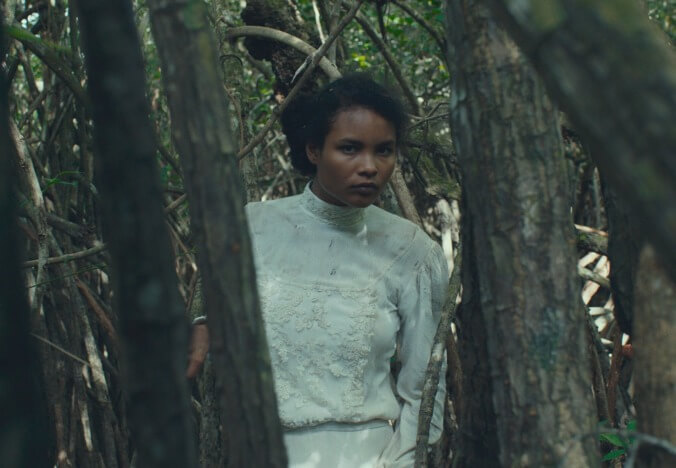Tragic Jungle’s plunge into the heart of darkness lacks the wildness of Herzog
Yulene Olaizola’s noirish Netflix period piece never captures the danger of its predators-turned-prey premise
Film Reviews Jungle
Quest narratives and exploration stories can typically be divided into two broad categories: those that preserve the romantic spirit of adventure, where nature is often a source of wonder and even renewal; and those that parody the very same, tracking descents into madness, misery, and confusion. Yulene Olaizola’s Tragic Jungle falls squarely in the latter camp. Set during the 1920s on the border of Mexico and present-day Belize (formerly British Honduras), it mainly follows a group of Mexican chicleros who, in the course of their work harvesting tree resin for chewing gum, come across a solitary, English-speaking woman named Agnes (Indira Rubie Andrewin). Fearing that she might belong to a competing British crew, they take her along forcibly, not knowing that she had just escaped from a vengeful white landowner (Dale Carley) whom she was supposed to marry, and who is still in hot pursuit. More ominously, perhaps, intermittent narration from one of the chicleros (Mariano Tun Xool), tells of Xtabay, a siren-like female of Mayan legend. Needless to say, things do not seem promising for any of the men involved.
Despite this background mythology, Tragic Jungle’s structure resembles nothing so much as film noir. The voiceover (spoken from some indeterminate time) imbues the proceedings with a kind of noirish fatalism, as do the obscure narrative turns and intentionally murky character work. Recalling the genre’s fixation on personal greed and gain, the chicleros plan to double-cross their boss and sell their tree gum themselves. Agnes in turn provides the film with its femme fatale—an archetype that has its roots in ancient mythology. Over the course of Tragic Jungle, she becomes increasingly associated with the mysterious threat and allure of the forest itself, and the film links her sexual exploitation to the sundry ravages inflicted on nature in the name of colonial expansion. The obvious implication is that Nature, like Agnes, will have her revenge.
This is all to say that Olaizola’s film is fairly well-conceived on the whole. Unfortunately, it’s also in the awkward position of recalling a number of better, richer movies. Tragic Jungle’s descent into madness feels decidedly studied in comparison to that of Werner Herzog’s Aguirre, The Wrath Of God, while its plunge into tenebrous darkness recalls, but falls far short of Tropical Malady’s riveting second half. It is no great fault that Tragic Jungle’s plot particulars are sketchily drawn: Olaizola is clearly less concerned with narrative suspense than with evoking the mix of sensuality, terror, and primal violence one often finds in Claire Denis’ work (particularly Trouble Every Day). But the film falters in that department, too, mainly serving up foreboding images of Agnes and/or the forest, coupled with a series of reaction shots from the increasingly terrified men. They start out as predators, but end up as prey.
Tragic Jungle does not lack for visual beauty: shot on location, it displays Olaizola’s background in documentary, as well as some deft compositions. What’s missing, though, is a genuine sense of danger, a feeling that things might spiral uncontrollably. The film rightly depicts various forms of exploitation (environmental, patriarchal, and colonial), but it fails to convincingly convey the primal impulses thrumming beneath, which tend to dissipate into slackly edited scenes and ponderous lines like “the jungle gives you plenty, but also takes a lot away.” More conceptual than intuitive, Tragic Jungle offers the problem without the passion: a journey into the heart of darkness without the thrill of the unknown.
4 Comments
I hope that Duran Duran’s “Hungry Like the Wolf” plays over the end credits
A wonderfully written review, even if the movie sounds like a dud.
Here’s a question. Why hasn’t anyone sat David Lynch and Werner Herzog down together in a room and just pointed a camera at them to see what happens?
They’ve loosely worked together in the past, as Lynch produced Herzog’s “My Son, My Son, What Have you Done”